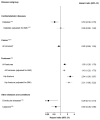Plant-based diets and long-term health: findings from the EPIC-Oxford study
- PMID: 35934687
- PMCID: PMC7613518
- DOI: 10.1017/S0029665121003748
Plant-based diets and long-term health: findings from the EPIC-Oxford study
Abstract
The concept of plant-based diets has become popular due to the purported benefits for both human health and environmental impact. Although 'plant-based' is sometimes used to indicate omnivorous diets with a relatively small component of animal foods, here we take it to mean either vegetarian (plant-based plus dairy products and/or eggs) or vegan (100% plant-based). Important characteristics of plant-based diets which would be expected to be beneficial for long-term health are low intakes of saturated fat and high intakes of dietary fibre, whereas potentially deleterious characteristics are the risk of low intakes of some micronutrients such as vitamin B12, vitamin D, calcium and iodine, particularly in vegans. Vegetarians and vegans typically have lower BMI, serum LDL cholesterol and blood pressure than comparable regular meat-eaters, as well as lower bone mineral density. Vegetarians in the EPIC-Oxford study have a relatively low risk of IHD, diabetes, diverticular disease, kidney stones, cataracts and possibly some cancers, but a relatively high risk of stroke (principally haemorrhagic stroke) and bone fractures, in comparison with meat-eaters. Vegans in EPIC-Oxford have a lower risk of diabetes, diverticular disease and cataracts and a higher risk of fractures, but there are insufficient data for other conditions to draw conclusions. Overall, the health of people following plant-based diets appears to be generally good, with advantages but also some risks, and the extent to which the risks may be mitigated by optimal food choices, fortification and supplementation is not yet known.
Keywords: Cancer; Cardiovascular; Plant-based; Vegan; Vegetarian.
Conflict of interest statement
None.
Figures


References
-
- Mann JI. Optimizing the plant-based diet. Asia Pac J Clin Nutr. 2000;9(Suppl 1):S60–64. - PubMed
-
- Davey GK, Spencer EA, Appleby PN, et al. EPIC-Oxford: lifestyle characteristics and nutrient intakes in a cohort of 33 883 meat-eaters and 31 546 non meat-eaters in the UK. Public Health Nutr. 2003;6:259–269. - PubMed
-
- Appleby PN, Thorogood M, Mann JI, et al. The Oxford Vegetarian Study: an overview. Am J Clin Nutr. 1999;70:525S–531S. - PubMed
-
- Allen NE, Sudlow C, Peakman T, et al. UK biobank data: come and get it. Sci Transl Med. 2014;6:224ed4 - PubMed
Publication types
MeSH terms
Grants and funding
LinkOut - more resources
Full Text Sources
Medical

